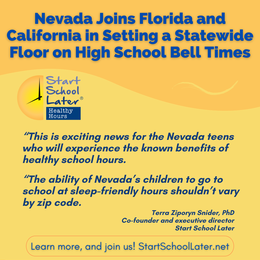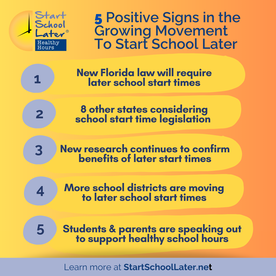Nevada Joins Florida and California in Moving Toward a Statewide Floor on High School Bell Times10/4/2023
Pediatricians and sleep experts have long urged later start times for teens  (Severna Park, MD) Today, the Nevada State Board of Education voted to continue to move forward a regulation to “set guidelines and guardrails for high school start times in all school districts and charter schools within the state.” The vote comes during Mental Health Awareness Week. Under the proposed regulation, Nevada high schools would be required to start no earlier than 8:00 a.m., or districts must provide alternative start time options to families and students. Annual waivers would be available for schools that show they face unique challenges. “This is exciting news for the Nevada teens who we hope will experience the known benefits of healthy school hours,” said Terra Ziporyn Snider, PhD, co-founder and executive director of Start School Later, Inc. “I’m grateful for the leadership of President Felicia Ortiz and other members of the Nevada State Board of Education for shepherding this statewide effort to support student well-being. The ability of Nevada’s children to go to school at sleep-friendly hours shouldn’t vary by zip code.” Setting a floor on how early high schools can start makes Growing alarm at the teen mental health crisis along with post-pandemic learning loss is spurring more and more leaders into action  (Severna Park, MD) Decades of research show that when school days start later for middle and high schoolers, students get more sleep, feel better, and perform better – in class, with friends and family, and behind the wheel. Here are five recent developments in the U.S. movement to start school later. Nine States Consider School Start Time Legislation in 2023 The movement toward safer, healthier school hours spearheaded by Start School Later Inc. continues to gain traction around the country This month, Florida joined California in passing a law to start school later (Severna Park, MD) This month, Florida became the second state in the nation to recognize the negative effects of too-early school start times on teens’ wellbeing. Joining California, Florida legislators overwhelmingly approved CS/HB 733. Now signed by the governor, the new law requires public middle schools and high schools to operate at healthy hours beginning in 2026.
Policymakers in eight other U.S. states are also considering legislation related to delaying secondary school class times, reflecting a growing recognition of the urgent need for school hours that support adolescent physical and mental health, safety, and school performance. Starting School Later Improves Teen Physical and Mental Health, Safety, and School Performance1/18/2022 Starting School Later Improves Teen Physical and Mental Health, Safety, and School PerformanceResearch Summit Provides Roadmap to Ensuring Sleep-Friendly School Hours Across the Nation (Severna Park, MD) Most U.S. schools should — and can — start later in the morning. That’s the conclusion of a virtual research summit held at Stanford University, organized in response to California’s “healthy school start time” law (SB328) scheduled for implementation later this year and co-sponsored by the non-profit Start School Later (SSL) and the California PTA. A new paper summarizing the summit findings is available online and will be published in the February edition of Sleep Health, the National Sleep Foundation’s peer-reviewed journal. The California law requires most public secondary schools in the state to protect adolescent sleep health by starting high schools no earlier than 8:30 a.m. and middle schools no earlier than 8 a.m. In recent years, over a dozen other state legislatures have considered legislation regarding school start times, including several currently considering bills similar to California’s. Recognizing this unique opportunity as California rolls out the new law, Start School Later spearheaded an effort to convene experts from a wide variety of disciplines to identify interdisciplinary research opportunities. By reviewing decades-worth of multidisciplinary research on adolescent sleep health and school start times in areas as diverse as health and education policy, juvenile justice, academic performance, health equity, and physical and mental wellbeing, the resulting summit created a roadmap to building on existing research and turning it into school policy. Click here to watch a recorded discussion of the Summit outcomes with Stanford’s Dr. Raphael Pelayo and other Summit participants. COVID-19 not just pushing schools to open later in the Fall, but later in the morning
(Annapolis, MD) Back-to-school and COVID-19 are colliding this year. Some schools are teaching online, some in-person, and some are using a hybrid model. Many middle and high schools especially are choosing to delay classes to 8:30 a.m. or later as recommended by healthcare professionals and scientists. "Changes that once seemed unimaginable and impossible are suddenly imaginable and possible," says Terra Ziporyn Snider, PhD, Start School Later's Executive Director and Co-Founder. "We keep hearing about districts that are moving to schedules that give students a shot at healthy sleep, both during the pandemic and beyond." Local seminars hosted last week by the nonprofit Start School Later (SSL) drew participants from over 50 Pennsylvania school districts as well as education stakeholders from Delaware, Maryland, New Jersey, and New York. The one-day workshops, “Adolescent Health and School Start Times: Science, Strategies, Tactics, and Logistics,” were held in Eastern Pennsylvania on November 13 and 14, and attracted over 175 superintendents, board members, administrators, health professionals, and community advocates.
California Dreams Fulfilled for Teens: Governor Newsom signs SB328, the school start time bill.10/13/2019 In a show of support for science and child health, California Governor Gavin Newsom has signed Senate Bill 328 (SB 328) into law. The bill, introduced by Senator Anthony Portantino, was passed by the state legislature and sent to Governor Newsom for approval. Under this new law, California’s middle schools can start required classes no earlier than 8:00 a.m. and high schools no earlier than 8:30 a.m. Specific scheduling within those parameters is left to local school districts, with allowances made for some rural communities. The guidelines go into effect in the 2022 school year for most districts.
A consensus letter has been forwarded to Members of the California Legislature and Governor Gavin Newsom, urging the passage of Senate Bill 328 (SB 328), a bill that would set healthier limits on how early in the day state middle and high schools can start classes.
Because of changes in the sleep cycle that occur during puberty, health experts recommend that middle and high schools start no earlier than 8:30 a.m. The bill, introduced by Senator Anthony Portantino, is co-sponsored by the nonprofit Start School Later and the California State PTA and has widespread support from a host of health, safety, and education groups including the American Academy of Pediatrics California, the California Medical Association, the California Police Chiefs Association, the American Academy of Sleep Medicine, the California Psychiatric Association, the National Sleep Foundation, and myriad hospitals and universities. Schools in at least 22 states to delay bell times this year.
[Updated 8/17/19] -- School districts in at least 22 states plan to delay morning bells this year according to the national non-profit Start School Later (SSL). Topping the list are 5 districts in Ohio, 5 in Pennsylvania, and 4 in Massachusetts and Colorado. “Every year, we see more districts moving bell times back to more reasonable hours in response to the research," observes SSL's Executive Director Terra Ziporyn Snider, PhD. “Health professionals have been telling us for years that teenagers cannot get healthy sleep when they have to wake at 5 or 6 a.m. for class. It’s gratifying to see so many communities prioritizing student health and safety by turning these recommendations into school policy.” Governor vetoes school start time bill supported by leading medical groups.
California Governor Jerry Brown vetoed Senate Bill 328, legislation that would have restricted middle and high schools from starting before 8:30 a.m. – a recommendation that has been made by the American Academy of Pediatrics, the Centers for Disease Control, and the American Medical Association. The bill, introduced by Senator Anthony Portantino, was sponsored by the nonprofit Start School Later and supported by a host of health, safety, and education groups including the California State PTA, the California Police Chiefs Association, the California Federation of Teachers, and myriad state hospitals and universities. |
 RSS Feed
RSS Feed